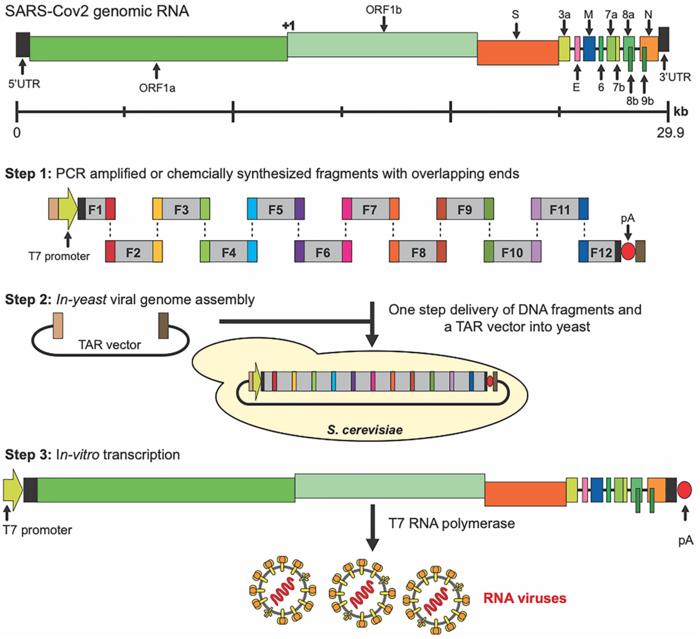“TAR cloning is used to genetically engineer synthetic viruses with novel properties that may be used for the development of new vaccines.”

Credit: 2023 Kouprina and Larionov.
“TAR cloning is used to genetically engineer synthetic viruses with novel properties that may be used for the development of new vaccines.”
BUFFALO, NY- January 8, 2024 – A new review paper was published in Oncotarget’s Volume 14 on December 22, 2023, entitled, “Transformation-associated recombination (TAR) cloning and its applications for gene function; genome architecture and evolution; biotechnology and biomedicine.”
Transformation-associated recombination (TAR) cloning represents a unique tool to selectively and efficiently recover a given chromosomal segment up to several hundred kb in length from complex genomes (such as animals and plants) and simple genomes (such as bacteria and viruses). The technique exploits a high level of homologous recombination in the yeast Sacharomyces cerevisiae.
“TAR cloning has become a valuable procedure for the selective and efficient isolation and manipulation of large DNA molecules. […] The ability to isolate individual gene alleles will help to clarify whether a particular allele is associated with predisposition to different diseases, including cancer.”
In this new review, researchers Natalay Kouprina and Vladimir Larionov from the National Cancer Institute’s Developmental Therapeutics Branch summarized multiple applications of the pioneering TAR cloning technique, developed previously for complex genomes, for functional, evolutionary, and structural studies, and extended the modified TAR versions to isolate biosynthetic gene clusters (BGCs) from microbes, which are the major source of pharmacological agents and industrial compounds, and to engineer synthetic viruses with novel properties to design a new generation of vaccines. TAR cloning was adapted as a reliable method for the assembly of synthetic microbe genomes for fundamental research.
“In this review, we also discuss how the TAR cloning in combination with HAC (human artificial chromosome)- and CRISPR-based technologies may contribute to the future.”
Read the full paper: DOI: https://doi.org/10.18632/oncotarget.28546
Correspondence to: Natalay Kouprina
Email: [email protected]
Keywords: transformation-associated recombination, TAR, microbes, biomedicine, biotechnology
Sign up for free Altmetric alerts about this article: https://oncotarget.altmetric.com/details/email_updates?id=10.18632%2Foncotarget.28546
About Oncotarget: Oncotarget (a primarily oncology-focused, peer-reviewed, open access journal) aims to maximize research impact through insightful peer-review; eliminate borders between specialties by linking different fields of oncology, cancer research and biomedical sciences; and foster application of basic and clinical science.
To learn more about Oncotarget, visit Oncotarget.com and connect with us on social media:
- X, formerly known as Twitter
- YouTube
- LabTube
- Soundcloud
Click here to subscribe to Oncotarget publication updates.
For media inquiries, please contact: [email protected].
Oncotarget Journal Office
6666 East Quaker Str., Suite 1A
Orchard Park, NY 14127
Phone: 1-800-922-0957 (option 2)
###
Journal
Oncotarget
DOI
10.18632/oncotarget.28546
Method of Research
Literature review
Subject of Research
People
Article Title
Transformation-associated recombination (TAR) cloning and its applications for gene function; genome architecture and evolution; biotechnology and biomedicine
Article Publication Date
22-Dec-2023




